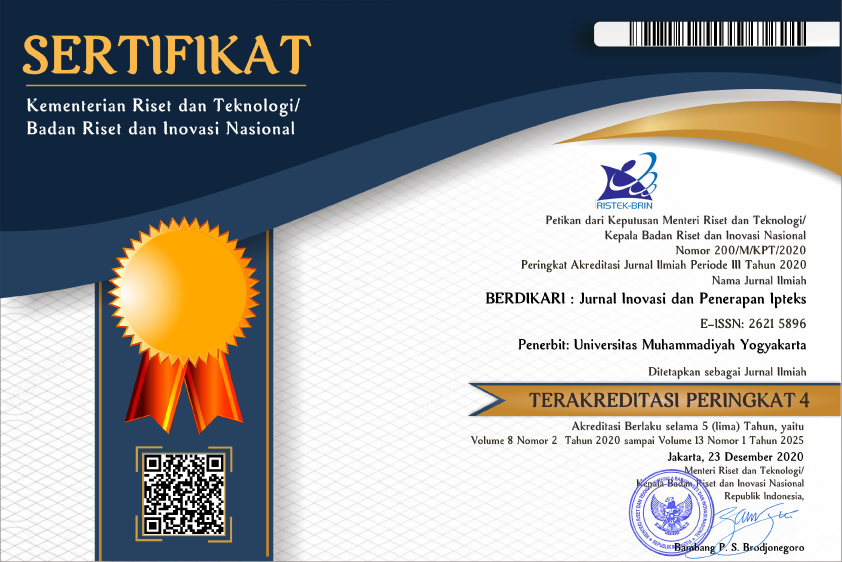Peningkatan Kapasitas Organisasi dan Inisiasi Program Bank Sampah Karang Taruna Swayasatwika
DOI:
https://doi.org/10.18196/berdikari.v12i1.10682Keywords:
Youth Organizations, Strengthening, Socialization, Mentoring, Work ProgramsAbstract
The role and function of youth organizations as youth social organizations have an important part in the process of building a village. Maximizing the role and function of youth is currently a major problem in various regions, problems that often arise are due to their inability to function optimally in terms of the ability to formulate work programs. The ability to understand the main tasks and functions of each division or part of the existing organization, such as the youth organization in Kluwih Hamlet, Balecatur, Yogyakarta. In this service program the solutions offered are first, to socialize various regulations and technical technical guidelines, as well as regulations related to the main tasks and functions of karang taruna institutions in general. The socialization also includes the division of tasks from each division, as well as how to arrange activity programs. The implementation method is in the form of socialization of organizational material as well as training in making regulations, preparing programs and activities. From the results of these activities, benefits can be obtained where the Swayasatwika youth organization has succeeded in making a work program regarding the initiation of a waste bank in Kluwih Hamlet. Through the waste bank work program initiated by the Swayasatwika Youth Organization, it is hoped that it can be one of the programs that can maximize the roles and functions of youth in Kluwih Hamlet youth organizations.
References
Arif, R., & Adi, E. a. (2014). Peran Karang Taruna Dalam Pembinaan Remaja Di Dusun Candi Desa Candinegoro Kecamatan Wonoayu Kabupaten Sidoarjo. Kajian Moral Dan Kewarganegaraan, 1(2), 190–205.
Dewadi, F. M. (2021). Implementasi Inovasi Pendidikan SDM dalam Karang Taruna Lintas Generasi Era Milenial. Jurnal Informatika Dan Teknologi Endidikan, 1(1), 47–54. https://doi.org/10.25008/jitp.v1i1.10
Imran Rosadi, Faris, A. (2019). Modernisasi Manajemen Bank Sampah Melalui Pemanfaatan Aplikasi Bank Sampah IT Mobile Pada Komunitas Bank Sampah TPI BISA Kelurahan Pagak Kecamatan Beji Kab. Pasuruan. Jurnal Soeropati,
(November), 1–18.
Jufriyanto, M. (2019). Pengembangan Produk Unggulan Sebagai Potensi Peningkatan Ekonomi Masyarakat Desa di Kecamatan Modung Bangkalan. Jurnal Pengabdhi, 5(1).
Karim, A. (2019). BUMDes as a Solution for Food Stock Preparation and National Economic Buffer in the “ Covid-19 “ Global Pandemic. ACADEMIA.
Kushartono, W. et al. (2020). Pengembangan Desa Mandiri Melalui Pengelolaan Badan Usaha Milik Desa ( Bumdes ). Jurnal Dinamika Ekonomi & Bisnis, 13(1).
Livana et al. (2020). Dampak Pandemi Covid-19 Bagi Perekonomian Masyarakat Desa. Indonesian Journal of Nursing and Health Sciences Volume, 1, 37–48.
Nursetiawan, I. (2018). Strategi Pengembangan Desa Mandiri Melalui Inovasi Bumdes. Jurnal Ilmiah Ilmu Pemerintahan, 4(2), 72–81.
Nursyamsu, R. (2018). Pelatihan Peningkatan Kapasitas Pemuda Dan Pembuatan Program Kerja Pada Organisasi Pemuda Desa Cibinuang, Kabupaten Kuningan. Jurnal Pengabdian Masyarakat, 1(1), 37–44.
Pratiwi, M. B., & Novianty, I. (2020). Strategi Bertahan Badan Usaha Milik Desa (BUMDes) dalam Pandemi COVID-19 pada Desa Cibodas Kecamatan Lembang Kabupaten Bandung Barat (pp. 26–27).
Rahmi, V. A., Ismanto, H., Fathoni, M. Z., Kewirausahaan, S., Gresik, U. M., Studi, P., … Gresik, U. M. (2020). Inovatif Saat Pandemi Covid “ Pelatihan Kewirausahaan Khas Perempuan Berbahan Sampah “ Kolaborasi Bumdes .”
DINAMISIA/ ; Jurnal Pengabdian Kepada Masyarakat, 4(3), 418–425.
Soleh, A. (2014). Strategi Pengembangan Potensi Desa. Jurnal Sungkai, 5(1), 32–52.
Suhartini. (2018). Analisa Swot Dalam Menentukan Strategi Pemasaran Pada Perusahaan. Jurnal Manajemen Dan Teknik Industri Produksi, 12(2), 82–87.
Sunarsi, D. (2019). Penerapan MSDM Strategis Dalam Upaya Meningkatkan Kemampuan Organisasi dalam. Jurnal Ilmiah MEA (Manajemen, Ekonomi, & Akuntansi), 3(1). https://doi.org/10.31955/mea.vol3.iss1.pp221-233
Sunoto, Imam, et. a. (2017). Mengukur Tingkat Partisipasi Pemuda Dalam Program Karang Taruna Dengan Pendekatan Metode Fuzzy Infrence. Jurnal Simetris, 8(2), 711–720.
Suripto, T. (2016). Strategi Meningkatkan Kinerja Perusahaan Melalui Budaya Organisasi Yang Islami. Jurnal Ekonomi Syariah Indonesia, VI(2), 144–153.
Wibowo, D. H. (2015). Analisis Strategi Pemasaran Untuk Meningkatkan Daya Saing Umkm ( Studi pada Batik Diajeng Solo ). Jurnal Administrasi Bisnis, 29(1), 59–66.
Widiastuti, N. (2018). Peran Tokoh Pemuda Dalam Meningkatkan Partisipasi Karang Taruna Di Desa Nanjung Margaasih. Jurnal Comm-Edu, 1(2), 94–104
Downloads
Additional Files
Published
Issue
Section
License
Copyright
Authors retain copyright and grant BERDIKARI Jurnal Inovasi dan Penerapan IPTEK the right of first publication with the work simultaneously licensed under an Attribution 4.0 International (CC BY 4.0) that allows others to remix, adapt and build upon the work with an acknowledgment of the work's authorship and of the initial publication in BERDIKARI Jurnal Inovasi dan Penerapan IPTEK.
Authors are permitted to copy and redistribute the journal's published version of the work (e.g., post it to an institutional repository or publish it in a book), with an acknowledgment of its initial publication in BERDIKARI Jurnal Inovasi dan Penerapan IPTEK
License
Articles published in the BERDIKARI Jurnal Inovasi dan Penerapan IPTEK) are licensed under an Attribution 4.0 International (CC BY 4.0) license. You are free to:
- Share — copy and redistribute the material in any medium or format.
- Adapt — remix, transform, and build upon the material for any purpose, even commercially.
This license is acceptable for Free Cultural Works. The licensor cannot revoke these freedoms as long as you follow the license terms. Under the following terms:
- Attribution — You must give appropriate credit, provide a link to the license, and indicate if changes were made. You may do so in any reasonable manner, but not in any way that suggests the licensor endorses you or your use.
- No additional restrictions — You may not apply legal terms or technological measures that legally restrict others from doing anything the license permits.




